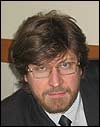© «Russia in
Global Affairs». № 3, July — September 2009
 There has been no traditional summertime
There has been no traditional summertime
lull in Russian politics this year. The breath of the crisis is
felt everywhere. In Russia, it forces the government to take
preventive measures – many analysts predict a hot autumn prone with
social problems. But in the international arena, new opportunities
are opening up, which Moscow does not want to miss.
The main event of the summer was the Moscow visit of Barack
Obama, who officially opened an era of a “reset” in U.S.-Russian
relations. Almost all commentators agree that the Moscow
negotiations were successful, although admittedly the Russian and
U.S. presidents avoided thorny problems. A report prepared by a
team of experts led by Sergei Karaganov and published in this issue
focuses on ways to broaden and complement the new Russian-U.S.
agenda. The authors say that the key to a real reconfiguration of
relations between the two countries lies in coordinating their
priorities, primarily with regard to regional issues.
Although the Cold War ended 20 years ago, there has not emerged
a European/Eurasian security system that would enjoy the trust of
all the participants. Meanwhile, the number of real or potential
hotbeds of conflicts arising along the continent’s perimeter has
been persistently increasing.
Boris Mezhuyev and the author of this article analyze the
proposal Russian President Dmitry Medvedev made more than a year
ago for building a new European security architecture. Oleg
Alexandrov discusses the situation in the Arctic, which is now
turning into an area of rivalry among adjacent nations. The expert
believes that creation of a regional security system in Northern
Europe could serve as a model for a pan-European security
system.
Tigran Torosyan focuses on the role of Turkey as a rising
regional power. Ankara has an increasing impact on developments in
the South Caucasus, Southern Europe and the Middle East. This is
evidenced – among other things – by a recent visit of Russian Prime
Minister Vladimir Putin to Turkey, which has become a landmark
event for relations between the two countries.
Ivan Safranchuk analyzes the Afghan conflict which the Russian
and U.S. presidents discussed in detail in Moscow. The author holds
that there exist possibilities for deepening cooperation between
the two countries in this sphere, but their interests do not fully
coincide. Also, the Afghan problem can hardly be solved without the
involvement of regional structures, above all the Shanghai
Cooperation Organization. Yevgeny Primakov writes about yet another
field of confrontation – the Palestinian-Israel conflict. The
author believes that the resolution of this conflict is crucial for
ensuring stability on a vast territory from the Middle East to
South and Central Asia.
Vladislav Inozemtsev analyzes the possible impact of the economic
crisis on the balance of powers in the world. In his view, the West
should make efforts towards cooperation with countries that found
themselves outside of the Western world’s orbit in the 1990s. This
refers, above all, to Russia and Latin American states. Only such
“Broader West” can counteract the challenges of the new
century.
Is Russia prepared to face these challenges? A section of this
issue devoted to Russia’s potential for transformation discusses
this question in detail. Olga Kryshtanovskaya analyzes the
principles of Russia’s authoritarian modernization in the 2000s and
concludes that the potential of this model has been exhausted.
Mikhail Afanasiev believes that Russian society has enough
resources for systemic renovation; however, the state machinery is
unable to use these resources properly. Tatyana Mitrova focuses on
changes taking place on the world energy market. The state of this
market is vital for Russia’s development. The scholar warns that
Russia must be ready for serious and potentially unfavorable
changes, which will require that it review its approaches.
Alexander Chepurin writes about Russian resources of a different
kind – he discusses possibilities that can open up for Russia from
interaction with Russian communities abroad.
Victor Kremenyuk raises a broader issue – he calls for rethinking
development priorities, which is imperative for an unbiased
analysis of the past experience. Dmitry Badovsky writes that social
therapy is more important than political liberalization for
Russia’s modernization project. This therapy includes the removal
of the monetary peg from values, the elimination of corporate
tendencies in society, the restoration of social mobility, and a
return to the principles of public solidarity.
Vladimir Pechatnov turns to the history of World War II, which has
been widely discussed both in Russia and the rest of the world of
late. Correspondence between Joseph Stalin and Sir Winston
Churchill from Soviet archives reveals interesting aspects of the
relationships between the leaders of the Allied coalition.
Our next issue will be devoted to the sweeping changes in Europe
and the world that were heralded by the fall of the Berlin Wall.
Modern Russia’s vision of developments over the past two decades
differs from the view that prevails in Europe.










